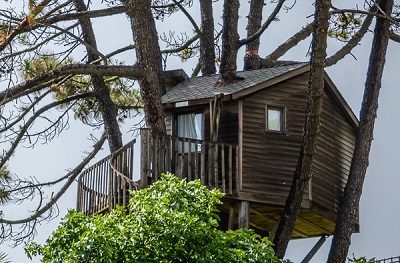
Treehouse between Lisbon and Cascais
Nothing kills the fun of travel faster than ill-suited accommodation. You can try to accept the inapt residence during short(er) travels, however, you cannot ignore it when traveling long-term. Are you also a female who travels solo (perhaps searching for a retirement paradise) we are no longer talking about fun but a necessity as your choice of accommodation can make or break the success of your mission. And no, it is not due to the (eventual) lack of fluffy pillows, jacuzzi, 70-inch tv or other fancy amenities. The success or failure of your trip does not depend so much on how fancy the accommodation is but where it is located. Furthermore, its importance only escalates with time and becomes…
- crucial when you travel full-time as you no longer look for a bed for the night but a home base for a few weeks or even months
- critical once you reach a certain age (and are no longer part of a free supply of friends, iow the hostel scene)
- deal breaker if you are also a woman
- a question of life and no-life when you are all of the above and also travel solo as not only your security but more importantly your sanity and well-being (social life) will depend on it
So, where can a 60+ (or less), full-time solo female traveler stay safe and sane during her travels? This is a multi-layered question with underlying issues specific to the region as well as their influence on travelers’ personal life.
A peace of mind first
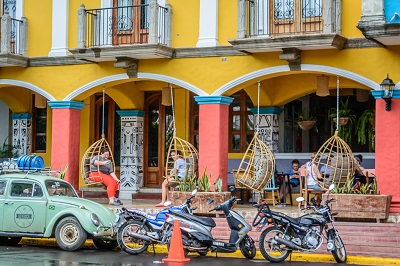
Central Park in Granada, Nicaragua
Location, location, location. As a long-term female solo traveler, the location is my priority number one. My security, sanity, and peace of mind, my social life – my life. Success or failure of my every trip begins and ends with where my home base is located.
The physical location (specific neighborhood) will vary from country to country but in general, there are two major factors that must be taken into consideration; safety and easy access to amenities and social life.
Let’s take Central America as an example. With an exception of the center of the city center, all Central American streets empty from all human existence at about 6 p.m., even earlier during winter months. Just after the sunset, once busy towns become ghost towns. No people strolling around and no cars driving by. Buu. The only company you may encounter are stray dogs. Walking home alone through deserted streets, even if it is only 100 meters and even if the street is so called “safe street”, feels very spooky and uncomfortable. The imagination goes wild. “Is someone hiding behind that tree?”, “Anyone hiding at the next corner?“, “Why is that door open? Anyone behind?“.
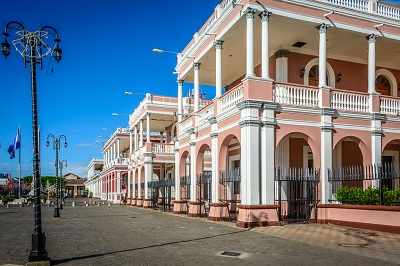
Central Park in Granada, Nicaragua
I may walk the deserted street once or twice upon my arrival when the curiosity and urge of exploring are at the highest peak. Already the second time I will walk, or rather jog, right in the middle of the street and keep all senses on the highest alert. But as soon as the novelty wears off and adrenalin rush kicks in I will stop walking/jogging and instead hurry home during the sunset subsequently saying goodbye not only to my love for night photography but also to my social life.
This is when home base ceases to be home away from home and becomes a prison.
location = number one
Loneliness
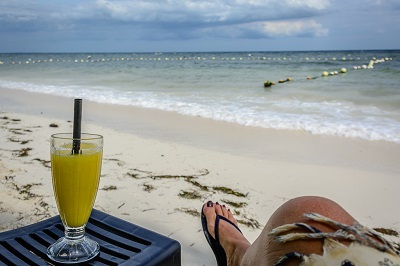
Breakfast for one
Loneliness during long-term travels is still somewhat of a tabu subject. But the sad truth is, longtime travel can be lonely. Very lonely. The longer you travel the more lonely it may become. Hence the possibility of rich social life, making new friends, meeting local expats and/or other travelers become (second) priority number one.
Travel slowly, the longer you stay at one location the better chance you have to boost your social life. (More on how to boost your social life)
location + social life = number one
Social Life = Location
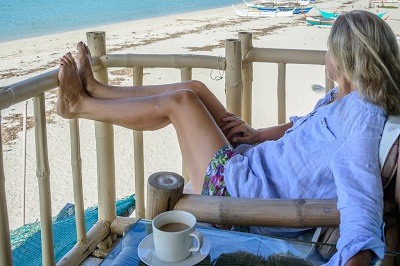
Bantayan Island – A keeper
You don’t want to live at a location that isolates you and jeopardizes your social life and life in general. You don’t want to rush home like Cinderella before a certain time, but feel free to live your life the way you like; visit cafes, galleries, bars, and restaurants anytime you choose, run down to the store whenever you want/need to, even take an evening stroll should you fancy that.
You want to expose yourself to social life rather than hide away from it behind the security of gated communities in the suburbs a.k.a. “prison walls”. Instead, you want to expose yourself to life in general, to different cultures, to live as locals live (within limits). Isn’t it what traveling is all about? Isn’t it why you left your home country in the first place?
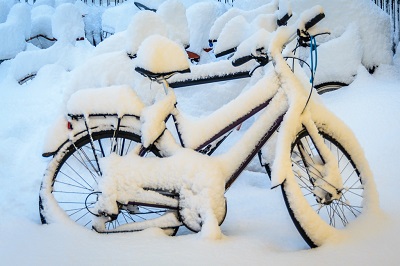
A bike is my second choice of transportation
You may wonder – Why not take a taxi? That will solve all the problems? Sure you may – once in a while when you go to a special event – to which you’d take a taxi anyhow to skip having to hop the cobblestones in your high heels.
Taxis don’t work in a long run. Not for me. Not for a city girl used to having the whole city right at her door. I walk, bike, or eventually take taxi – in that very order.
I don’t want to have to always rely on taxis each time I need to go for a milk run, go on a date or run some other errands. It requires planning, kills spontaneity and fun, not to mention all the stress I’d rather avoid that haggling, wheeling and dealing with (Asian or Central/South American) taxi drivers bring upon me. I just want to run down to my convenience store or anywhere else anytime I choose without having to arrange transport and without having to feel uncomfortable someone might be following me if I don’t.
Freedom of (secure) movement is also my priority number one.
location + social life + freedom of movement = number one
Where to live then?
There where the streets are properly lit and walkable even after the sunset; where hotels, restaurants, bars and convenience stores are; where tourists party, expats meet, locals gather in the evening. So, where is that exactly?
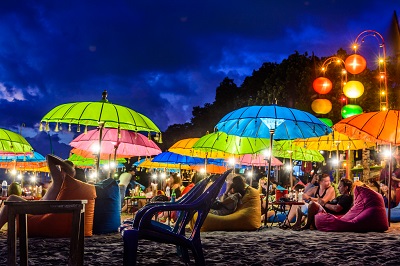
Seminyak, well lit and walkable beach in Bali
Central Park
Right in the center of the town center if you travel through Central America. To feel secure, remain sane, move freely and be social you need to live in the center. Preferably right at or in a very near proximity to the Central Park. The proximity varies from town to town and could be anything between two and eight blocks.
Note: Central Parks are not really park-parks but main squares full of city buzz with stalls, markets, and even small Tivolis; social hubs where all towns’ activities take place, where locals gather in the evening to chill and where small kids come to play.
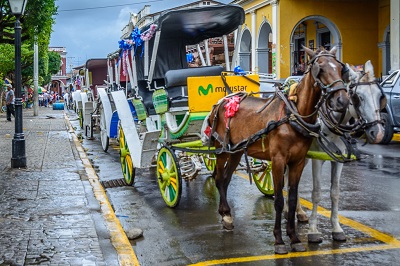
Central Park in Granada, Nicaragua. Again
All Central Americans cities and towns are built the same way – with Central Park right in the middle. Those central areas are pretty small, sometimes only a few blocks, thus make sure your accommodation is within “the city blocks”. Often only half a block can make all the difference.
In third world countries, the further distance from the city center, the poorer the neighborhoods. The poorer the neighborhood the more likely your camera gear or any other visible gadget may be the focus of unwanted local attraction.
Main Street
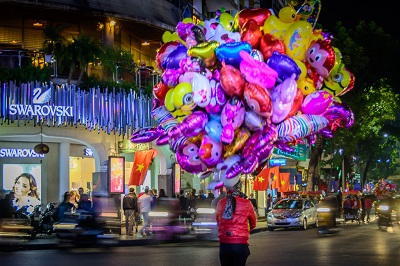
Hanoi, Vietnam – walkable city center
What about places where there is no Central Park, say in Asia? Main Street or streets work just as well. Go to Booking.com and look for hotels in town you’ll be visiting, Click on any hotel and then ‘Show map”. You’ll get a perfect view of where all hotels are located. Pick the largest cluster in areas marked with yellow – this is where you want to stay, especially when you are a 60+, full-time solo female traveler.
There is a perfect reason why all those hotels are clustered together in one place. The place is in a central location, hosting many landmarks, well lit, walkable, full of people, restaurants, bars, cafes and mini markets. This is the place popular with visitors and locals where you can easily meet other travelers, hang out and socialize. Above all, living here will allow you walking to/from your accommodation without feeling intimidated, uncomfortable or scared. It might be somewhat touristy but this is a small price to pay. Keep also in mind that touristy places are watched by private security companies, tourist police and regular police equipped with machine guns. Better one too many tourists than the lonely alternative of isolation… unless isolation is what you are looking for.
Do a search for best places to stay at your destination as well as the worst. And remember what may work in one town doesn’t necessarily work in another. The secure central parts of Central America are anything but in South America. In fact, El Centro of many South American countries (as opposed to Central Parks in CA) is a no-go-zone. If you’re unsure join expat community on Facebook and find out where the expats live. Expats communities are typically the most secure parts of town. (But also the most expensive.)
What type of accommodation works best?
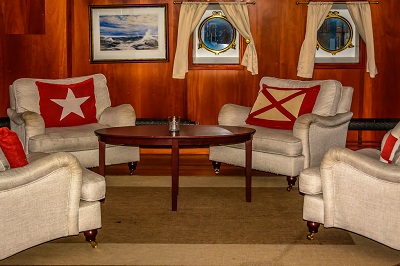
Yacht hotel in Gothenburg, Sweden
Clean bed, lamp, wifi, coffee maker and a bathroom with or without toiletries for a couple of nights is no longer enough for me.
I do not look for a bed for the night or two but a home base where I can stay for weeks and live a life as normal as only possible for as long as I like. No rush, travel slowly are the keywords. Two weeks per destination, longer if the home base feels more like home.
Nor do I look for a jacuzzi, room service, high def tv or any tv for that matter. What I need is a home away from home, office away from the office, a place where I can ‘put my hat’ even if it is only for a week. (And btw I don’t even own a hat, even though I should in this climate). Ideally, I am looking for a place with a sitting area, kitchenette, private bathroom with working plumbing and hot water (seldom provided in Central and South America), wifi, terrace/balcony, plenty of light and a few housemates. Right at or by the Central Park (if I am in CA).
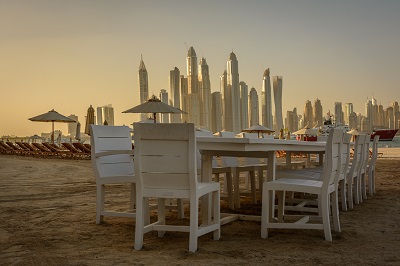
Fine dining on the beach in Dubai.
As pictures, descriptions and even reviews on booking sites can sometimes be deceiving I only book for a couple of nights. If I like the place, I extend my stay. If not, I have two days to find something else which is quite an easy task as I am already at the location and can view properties of interest.
When you travel slowly, there is no rush to visit landmarks, go on tours or do other touristy things. Quite frankly all these things become secondary. Far more important is establishing a home base; checking out the neighborhood, corner grocery store, local community; unpacking suitcases; learning local lifestyle and assimilating to it. After all, I’ll be spending lots more time ‘at home’ than a regular visitor.
In fact, I’ll be spending much more time at home than I ever thought I would. Longtime traveling, packing & unpacking can be very tiring, mentally tiring, thus staying ‘at home’ doing simple sweet nothings (like boring ironing) can be very refreshing, energizing and nourishing. Essential for overall wellbeing. And also a crucial puzzle bit when the time comes to answering the most important existential question of them all “Is this place a place for me?” “Is this my retirement paradise”.
So what works best? All three alternatives described below work pretty well for me. And there is definitely no need to pick just one, I alternate between them according to my needs and what works best at a specific destination.
Hotels?
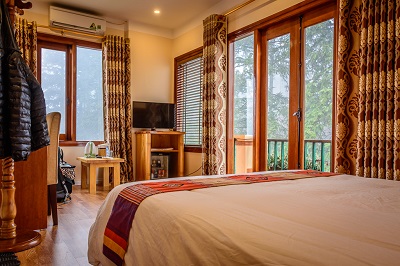
Hotel room in Sapa, Vietnam
It isn’ the fancy five stars hotel but a family-run small 20-30 bed boutique hotel that is the best option for 60+, full-time solo female traveler. This is where you’ll get the best value for money, the best genuine care and the best shot at social life.
Small boutique hotels have always a small cozy breakfast room (and often other common spaces) where you can meet and chat with other guests many of which are solo travelers just like you.
Rooms are almost always equipped with coffee/tea maker, small fridge and often even a micro. This is all I really need. For a while. I typically book a hotel room for two/three nights. If I like it I talk to the owner/manager and ask for a weekly/monthly rate.
TIP: If you are in Asia, zoom out the map as much as you can to make sure the hotel’s location is really on the main street and not in a small alley just off the street. These alleys, no matter how short, are always rat infested and most unpleasant to walk on.
Airbnbs?
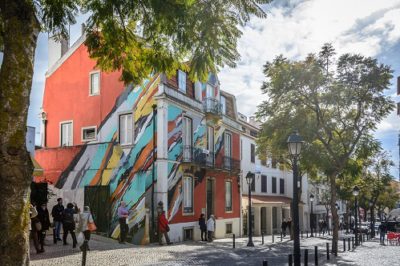
My Airbnb in Cascais, Portugal
Airbnb is a relatively new concept to me. I’ve been staying in Airbnb rooms for a few months now and, for the most part, quite enjoyed my stay.
It all started in Cascais, Portugal a few months ago where I discovered that my hotel room was also an Airbnb accommodation. In fact, as it turned out the whole Cascais and Portugal were one giant Airbnb. Today, the whole world has gone Airbnb mad. The options are endless.
The original concept was to let a spare bedroom to traveling guests, share breakfast with them, suggest few sightseeing tours, (hopefully) make new friends and make a bit of extra money in the process. That was then…
|
…Today everyone is trying to cash in. Hosts turn their villas and even apartments into guesthouses renting out every single bedroom or any room they may have including the living room. Today, there are so many options that the decision-making process becomes more and more difficult and time-consuming. Living in someone else’s bedroom works pretty well most of the time but can also have its own challenges… |
Guest vs Host
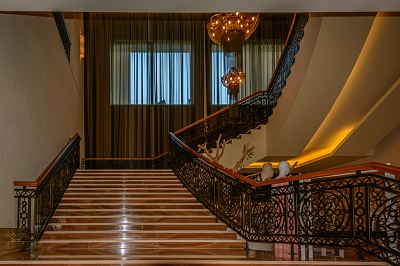
Staircase to heaven .. or hell?
I personally do not like staying in a place where I am the only guest (original idea). It feels too intimate, too private. I am not used to “sharing a flat” with anybody, thus I am not sure how to interact with total strangers on their own premises and feel very uncomfortable using any facility (kitchen. living room sofas) other than the bedroom confined to me. I feel more like an invader than a guest. It doesn’t really work for me.
Things don’t always work for hosts either. They feel discomfort and frustration when guests treat their home as hotel and/or demand service. They feel they have opened the doors to their own private home and want guests to respect that. “This is not a hotel and I am not your servant” – they complain. “After all, this is my home.”
This causes a delicate dilemma. Where do you draw a line? For as much as I understand hosts’ standpoint, I am not sure how I’d react to “This is my home” reminder. Probably move out on the spot. Being an overnight guest at friend’s house is not easy, let alone stranger’s.
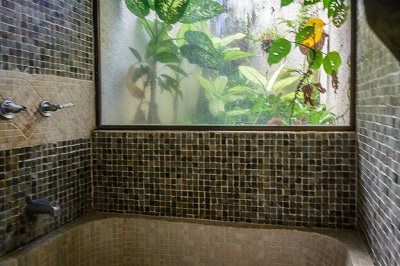
My private bathroom and garden in Costa Rica
This is why I like so much better staying in houses turned into guest houses or family houses where more than one room (preferably three) is Airbnb. These Airbnbs are (for me) the best option. When they work they really work, there is nothing better. Three guests change household’s dynamics and interaction with a host completely. This is no longer one on one interaction where the host always has an upper hand but a group of equal friends sharing their love for travel (and the host is yet another traveler).
In addition, sharing living room, kitchen, garden and other common areas with other guests give an opportunity to meet kindred travelers, exchange information or just socialize and have fun. Many guests are (surprise, surprise) older solo travelers eager to socialize with housemates at the house and also eager to explore together the world outside of the house. Win-win situation.
I normally book a room for one week. Weekly bookings offer 10-30% discount. Occasionally even more. If things work well I make a deal with the host to extend my stay.
Note: Prior to booking, Airbnb.com does not show the exact location of accommodations, which makes pinpointing them impossible. Write to the host and ask for info you need prior to booking.
How about hostels?
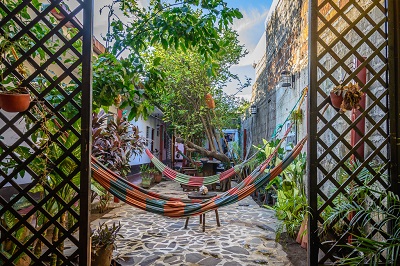
My hostel accommodation in Leon, Nicaragua
Hostels cannot be of any interest to 60+, full-time solo female traveler? Or can they?
A few weeks ago, while visiting Leon Nicaragua, I stayed in a hostel for the first time ever in my entire life. What a pleasant surprise. Hostels these days offer private rooms. In ‘my’ hostel, owned and run the Dutch way by a great Dutch guy, there was only one dorm, the rest were privates (as they are called), that is private rooms with ensuite bathrooms. I loved it. Great atmosphere. Easy to meet other travelers. All info I needed was in the reception. I could book tours and shuttles. No second (uncomfortable) thoughts regarding the kitchen usage as it may be in Airbnbs. But what surprised me the most was that almost all travelers staying in privates were older. It was a total success and I’ll have no problem booking a hostel again another time.
Last word of wisdom?
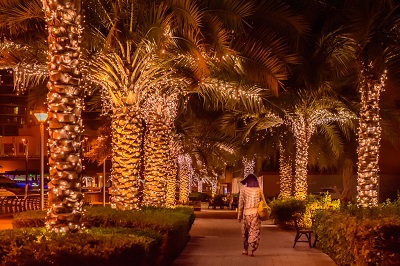
A night stroll in Dubai Marina
So what about the security? Killings, robberies, pickpocketing? There are a zillion horror stories about all sort of terrible things happening. Most of them are second, third, fourth hand accounts. Very few are first hand. Why? How many encounters did you have with killings, robberies, pickpocketing in your own country? How many did you witness? None?
I haven’t either. For there is really nothing to worry about… not, unless you are a gang member, sell drugs or walk around alone at 2 a.m. drunk and vulnerable.
Just use common sense as you would in your hometown and, for your own freedom of movement, convenience, and peace of mind, reside in the city center where you in addition to the above can also enjoy your social life to the fullest.
Happy travels.
p.s. Update: Not that it really change anything (but) I was unlucky to encounter a mugging. Sadly, it did happen to me. A month or two after I had written this post. Safe travels.






I really wish to travel like this when i am 60. Absolutely amazing. These are good tips for all the ages i think. Totally agree that location is very important.
Don’t worry. You will 😉
Great tips Eva, even for a 60 (almost) male. Sorry to hear about your mugging in the update … unfortunately that can happen anywhere, traveling or not. Your experience and your attitude and advice are inspiring. Your comparing the different options from experience, enlightening. Thank you!
Thank you Michael for your comment. Much appreciated.
just came across your blog and really loved it … Looks like you may have got another reader.. Loved the article and it all makes total sense. the Gues/Host phenomena is something which i too battled for a bit with 🙂
Thank you Rohini… and welcome 😉
A fantastic read. One problem I have when travelling to a city is trying to work out from the map where to stay. Without knowing the geography so well, it’s hard to tell if you’re going to be in the middle of nowhere or in a thriving and active community.
I couldn’t agree more about trying to stay central. As a professional full-time writer myself, I’m starting to realize the need to live around other people–to be able to pop out to a coffee shop whenever I want a change of scenery. My wife and I are planning a move to Hanoi over many other options, and one of the motivating factors is exactly this. It’s great to be able to escape into the wilds once in a while, but most of us need human company, amenities, and to be in a place where we feel safe.
Thank you Chris. The best way to learn about various neighborhoods and their safety, as well as no-go-zones, is by joining expat groups on Facebook. Members are super friendly and very helpful. They can answer all questions in detail.
For writers contact with other people is (imho) even more important than for non-writers, simply because writers feed on intellectual stu=imulation and inspiration. It is not that easy to be creative without any human input. Having been on the road for almost 900 days I’ve realized it is not so much the place per se but people living in a location (social life) that are main contributors to our own existence. Hope things will work out for you in Hanoi. Don’t forget to bring winter jackets. Winters are brutal there 😉 Happy and safe traveling. Eva
This is so great! I admire you for going out and travelling on your own. In my country, after 60, many people prefer to just go visit family and limit themselves to that. I know my grandparents only moved around if my parents drove them to the mountains or to resorts, and that’s a pity. However, over generations, I can see things changing: my parents are closing in on 60 and they’re currently driving around Greece. It might also be a thing of educational background (my neighbor is close to 80 and she’s travelling a lot) or cultural background (the 80-year-old grandfather of my French boyfriend is coming over tomorrow, to visit Bucharest, where we’re currently based). But anyway,all of this is giving me hope 🙂
Thank you, Mirela, much appreciated 😉 The times are definitely changing, even in the countries which aren’t traditionally ‘travel superpowers’. Look at China. The economy is better, people no longer need to be stationary to do their job. The Internet has opened many doors. The world is no longer “the big unknown”. 35 years ago my kids were the only kids on the plane. Today planes look more like kindergartens. So… there is definitely hope. Sooner or later the countries that are behind today will catch up. Thank you for your comment and happy travels… but above all enjoy your visitor tomorrow.
I like all the talk about establishing a home base. Makes the most sense to me, too. As I am rapidly approaching 50, my travel needs have changed drastically in the last 10 years so I am with you about location being the #1 factor.
Thank you Melody. In places like Central or South America, the age doesn’t really matter. A solo female traveler will always feel more secure staying amongst people rather than isolated deserted areas. Happy travels. Eva
I’m grateful that I have begun traveling while young, so lots of these things don’t bother me yet. Although I do agree very much on location. I like to be as central as possible, without spoiling my budget.
May I start by saying I want to be you when I grow up? Sorry to hear about the mugging! That must have been terrifying.
Loved reading this post. We travel as a family so some aspects of our approach to housing are very different from yours but some (like looking for a place in a central area that has a kitchenette). The photos are lovely! Did you stay at the treehouse?
Ah, thank you so much. Much appreciated. Do you know what? You will, no doubt about it. Of course, family travel and long-term solo travel are quite different as families, especially with children, are not dependent on meeting new people or making new friends (even though it may be welcome).
I didn’t stay in that tree house but I may next time I am in the area which may be this summer. I believe the house is on Airbnb. Happy travels. Eva
I believe that most of these tips are great, even if you are under 60. I do agree that location is one the most important factors when booking, do not like to spent too much time in transit.
Pingback: Cancun - all inclusive vacation factory > One way ticket to Panama